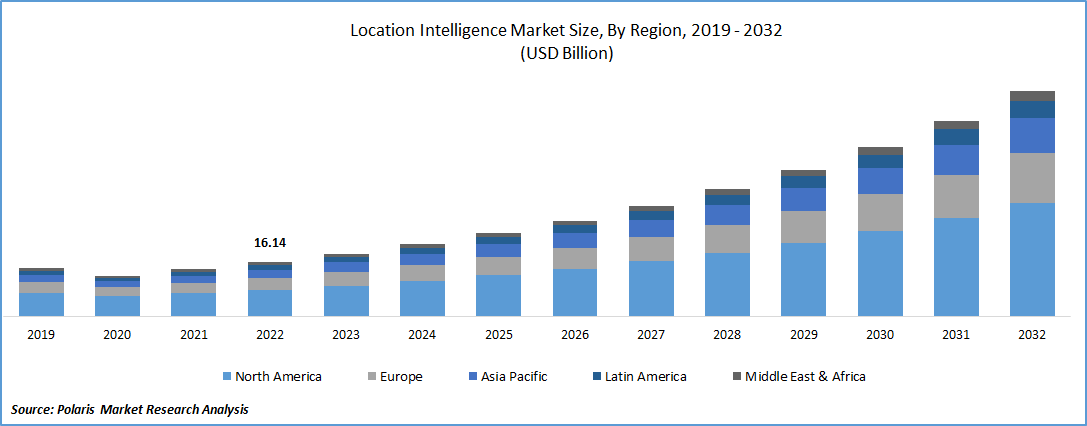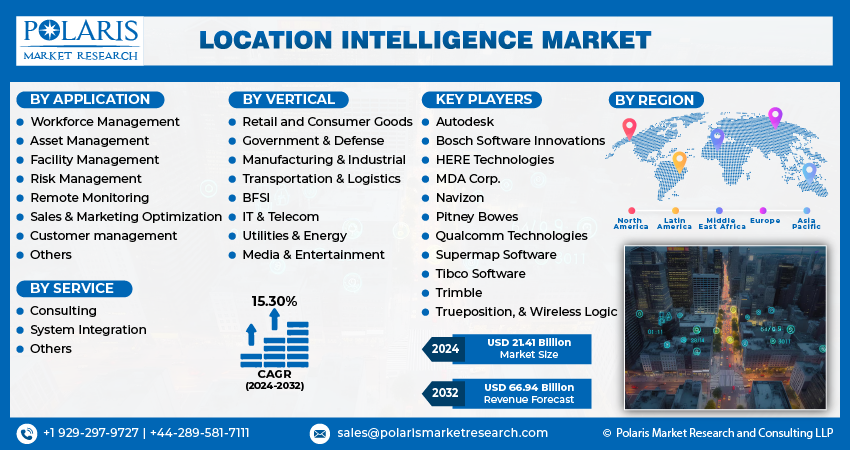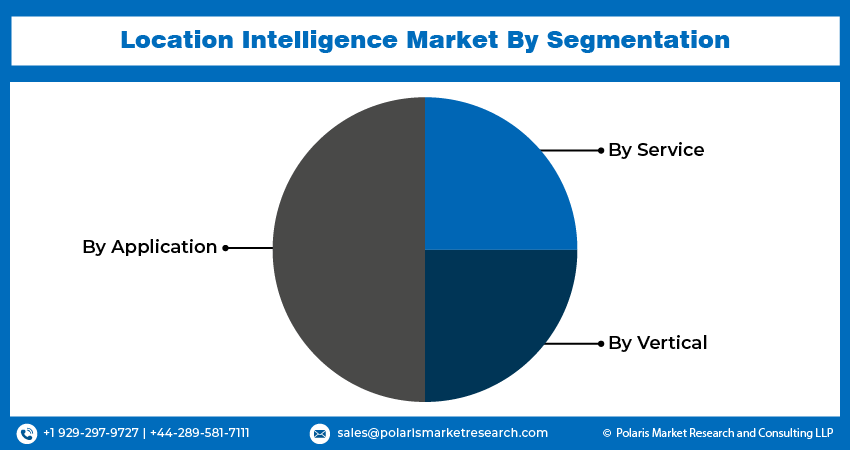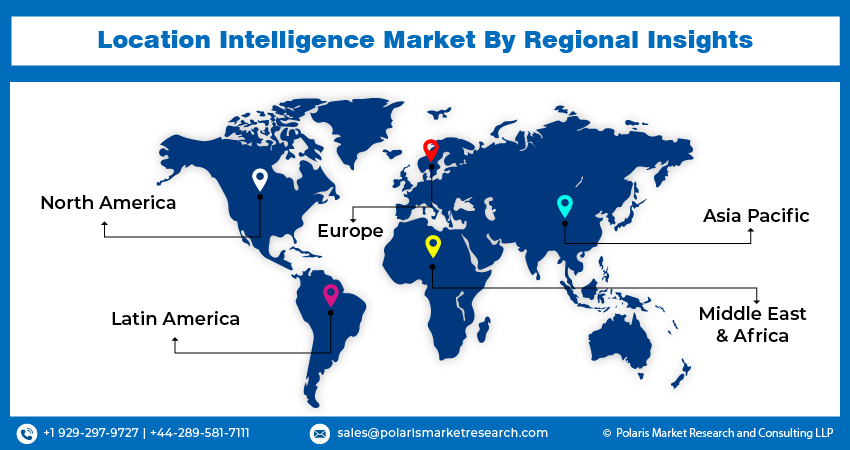
Location Intelligence Market Share, Size, Trends, Industry Analysis Report
By Vertical (BFSI, IT & Telecom), By Application (Remote Monitoring, Risk Management), By Service (System Integration, Consulting), And Segment Forecasts, 2024 - 2032
- Published Date:Jan-2024
- Pages: 118
- Format: PDF
- Report ID: PM3749
- Base Year: 2023
- Historical Data: 2019-2022
Report Outlook
The global location intelligence market size and share was valued at USD 18.59 billion in 2023 and is expected to grow at a CAGR of 15.30% during the forecast period.
Location intelligence refers to the methodology of visualizing and analyzing geospatial data to identify trends and relationships that lead to actionable information. It builds on geographical information system (GIS) tools to offer analytical and operational business solutions. With location intelligence, companies and governments can acquire key datasets, such as GPS data, point of sales data, and transactional data, used for comprehensive geospatial analysis. Stakeholders use the technology to gain an in-depth understanding of where and why things are happening and plan what to do next.
Location intelligence is used by businesses from several industries to improve their processes. Some of the top use cases of the technology are delivery management, supply chain optimization, market analysis, data visualization and mapping, IoT and smart cities, and indoor mapping. Using location intelligence, organizations can enhance their business intelligence, analyze customers, find growth opportunities, and improve customer experience. The growing emphasis on asset management across several industry verticals is projected to boost location intelligence requirements in the coming years, impacting the location intelligence market demand favorably.
Industry's growth is expanding owing to the emergence of smart devices and the rising investments in the Internet of Things (IoT) and network services. These factors contribute to developing more intelligent applications and enhanced network connectivity. The emergence of the COVID-19 pandemic led to a heightened adoption of location intelligence solutions, which were used to navigate the evolving business landscape. These solutions aid businesses in analyzing, mapping, and exchanging customer-related data based on geographical location.

To Understand More About this Research: Request a Free Sample Report
Extensive utilization of mobile applications coupled with the advanced location-sharing features of mobile devices has brought about a significant transformation in delivering services to end-users. Integrating location intelligence and in-store location technology elevates the customer experience by facilitating swift and efficient product location. IoT represents a rapidly expanding network of internet-connected devices that collects extensive data through mobile and fixed sensors. Real-time processing of this gathered data is paramount for contemporary public and private sector analytics.
By enabling real-time data processing, location intelligence empowers businesses to delve into their data, unveiling concealed patterns, relationships, and distinctive insights that ultimately steer more informed decision-making. While the industry is projected to experience consistent expansion due to its advantages, growth could be impeded by factors such as limited awareness, a lack of expertise, operational complexities, and concerns over data privacy.
Consumer reservations concerning technologies potentially exposing personal information and compromising safety are a significant obstacle to market expansion. This apprehension underscores the importance of manufacturers and service providers implementing robust security measures to guarantee the safety and privacy of customer data. The evolving global business landscape has compelled companies across diverse sectors to embrace technological advancements. Notably, post-pandemic location technology has become a pivotal enhancement to business operations. Incorporating location analytics enables enterprises to navigate the uncertainties generated by the pandemic effectively.
The location intelligence market report details key market dynamics to help industry players align their business strategies with current and future trends. It examines technological advances and breakthroughs in the industry and their impact on the market presence. Furthermore, a detailed regional analysis of the industry at the local, national, and global levels has been provided.
Industry Dynamics
Growth Drivers
Increasing adoption among institutions
Healthcare and governmental institutions adopted location-based solutions to effectively execute COVID-19 vaccination campaigns, contributing to the success of public health initiatives. Additionally, the increasing emphasis on asset management across various industry sectors is projected to drive location intelligence requirements in the coming years. Positioned within the broader scope of IoT technology, location intelligence enables businesses to discern consumer trends, understand consumer behavior, and access diverse insights about niche markets. This capability enables businesses to enhance their services and products, facilitating informed decision-making and addressing market uncertainties more effectively.
Additional advantages of location intelligence encompass risk assessment, predictive analytics, immediate monitoring of patterns and tendencies, and optimizing company operations and services. The escalating trend of digital transformation has empowered organizations to gather user data, a factor expected to fuel the expansion of the industry. Augmenting customer experience is a prominent catalyst behind the increasing uptake of location intelligence. The growing investments in infrastructure and the adoption of novel technologies have given rise to many business-to-business (B2B) and business-to-consumer (B2C) applications. These include sales and marketing, customer management, and facility oversight.

Report Segmentation
The market is primarily segmented based on application, service, vertical, and region.
|
By Application |
By Service |
By Vertical |
By Region |
|
|
|
|
To Understand the Scope of this Report: Speak to Analyst
By Application Analysis
Sales & marketing segment accounted for the largest share in 2022
The sales marketing segment held the largest share. Location intelligence tools are crucial in simplifying the intricacies of sales and marketing procedures. These tools efficiently gather pertinent data required for marketing campaigns and facilitate the prediction of outcomes, ultimately streamlining the processes. Moreover, location intelligence is pivotal in remote monitoring and managing inventory, energy consumption, and temperature within facilities. Additionally, it allows tracking and overseeing the workforce in both indoor and outdoor settings. Adopting location intelligence empowers enterprises to gauge room occupancy, project maintenance schedules for assets, oversee employee activities, and effectively administer remote staff.
By Service Analysis
System integration held the largest revenue share in 2022
System integration held a significant market share. The imperative drives the surge in demand for system integration to seamlessly incorporate new data streams into existing infrastructures. This is particularly relevant as the penetration of IoT continues to rise, leading to the accumulation of substantial location-related information. System integrators play a pivotal role in assisting diverse industries in harmonizing their assets, business operations, and products with location intelligence. Doing so facilitates data collection that can be further analyzed to derive meaningful insights.
The consulting segment will grow at the fastest pace. This service is pivotal in identifying and prioritizing various business scenarios where location intelligence yields substantial value. Through consulting services, companies can harness location intelligence to effectively gather, analyze, and scrutinize pertinent information, enabling them to provide more accurate insights to other organizations.
Location intelligence is crucial in guiding companies through collecting, analyzing, and interpreting relevant data. This enables them to offer well-informed recommendations to other organizations. Various industries seek guidance from IoT consulting and location intelligence firms to integrate location intelligence tools seamlessly into their business operations, enhancing their overall effectiveness.
By Vertical Analysis
Consumer goods segment is expected to witness the highest growth during the forecast period
The consumer goods segment will grow at the fastest pace. This upward trajectory can be attributed to the sector's effective resolution of retail-related challenges. These challenges encompass a range of aspects, including predicting store sales, profiling drive times and distances, optimizing networks and simulating scenarios, planning site selections, evaluating franchise areas and overlap, analyzing sales and market shares, estimating market demand by location and product, optimizing territories, and profiling customer segments.
It also offers a comprehensive framework that leverages advanced site selection techniques. These techniques include intricate modeling approaches and practical field assessments. Through these methodologies, location intelligence assists in identifying optimal sites for various purposes, such as distribution centers, stores, and service centers. This capability is pivotal in ensuring the precise placement of retail and consumer goods facilities to enhance operational efficiency and customer service.

North America region dominated the global market in 2022
North America held the largest share. This region's growth trajectory is anticipated to remain steady throughout the forecast period. The adoption of smartphones in the region reached approximately 80% in 2022 and continues to rise incrementally. Moreover, the growth is also due to the rapid expansion of business intelligence analytics and geographic information systems technology.
APAC is anticipated to be the fastest-growing region. Within the region, governmental bodies and municipal organizations are enhancing their services by analyzing asset location data to enhance the quality of life and reduce the burdens on citizens. Consequently, businesses are increasingly adopting location intelligence tools to optimize asset management, streamline operations, and improve efficiency.

Competitive Insight
The location intelligence market is fragmented and is anticipated to witness competition due to several players' presence. Major key players in the market are constantly upgrading their technologies to stay ahead of the competition and to ensure efficiency, integrity, and safety. These players focus on partnership, product upgrades, and collaboration to gain a competitive edge over their peers and capture a significant market share.
Some of the major players operating in the global market include:
- Autodesk
- Bosch Software Innovations
- HERE Technologies
- MDA Corp.
- Navizon
- Pitney Bowes
- Qualcomm Technologies
- Supermap Software
- Tibco Software
- Trimble
- Trueposition, & Wireless Logic
Recent Developments
- In July 2023, HERE Technologies unveiled the “HERE Anonymizer,” an innovative tool for anonymizing location data within self-hosted environments. This advanced solution caters to historical and real-time location data, ensuring the preservation of data privacy throughout the process.
- In June 2023, Qualcomm Technologies introduced cutting-edge satellite solutions for enhanced remote monitoring and asset tracking within the realm of IoT. These comprehensive solutions encompass the Qualcomm 212S Modem and Qualcomm 9205S Modem chipset, equipped with satellite capabilities.
- In June 2023, Autodesk introduced “Autodesk Forma,” a forward-looking cloud-based solution for advanced building design. With its expanding range of capabilities, Autodesk Forma promises to enhance location intelligence within the architecture, engineering, construction, and operations sectors.
Location Intelligence Market Report Scope
|
Report Attributes |
Details |
|
Market size value in 2024 |
USD 21.41 billion |
|
Revenue Forecast in 2032 |
USD 66.94 billion |
|
CAGR |
15.30% from 2024 – 2032 |
|
Base year |
2023 |
|
Historical data |
2019 – 2022 |
|
Forecast period |
2024 – 2032 |
|
Quantitative units |
Revenue in USD billion and CAGR from 2024 to 2032 |
|
Segments Covered |
By Application, By Services, By Vertical, By Region |
|
Regional scope |
North America, Europe, Asia Pacific, Latin America; Middle East & Africa |
|
Customization |
Report customization as per your requirements with respect to countries, regions, and segmentation. |
Gain profound insights into the 2024 location intelligence market with meticulously compiled statistics on market share, size, and revenue growth rate by Polaris Market Research Industry Reports. This thorough analysis not only provides a glimpse into historical trends but also unfolds a roadmap with a market forecast extending to 2032. Immerse yourself in the comprehensive nature of this industry analysis through a complimentary PDF download of the sample report.
Browse Our Top Selling Reports
Rye Market Size, Share 2024 Research Report
Packaged Salad Market Size, Share 2024 Research Report
Coworking Spaces Market Size, Share 2024 Research Report
Pessary Market Size, Share 2024 Research Report
High Altitude Platform Market Size, Share 2024 Research Report
FAQ's
The location intelligence market report covering key segments are application, service, vertical, and region.
Location Intelligence Market Size Worth $66.94 Billion By 2032.
The global location intelligence market is expected to grow at a CAGR of 15.3% during the forecast period.
North America is leading the global market.
key driving factors in location intelligence market are increasing adoption among institutions.
